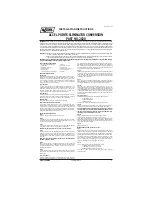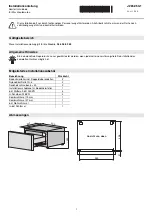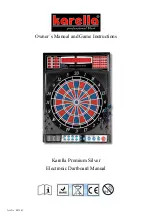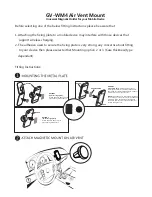
Unit Description
5-16
THERMO KING SR BASIC OPERATIONAL SEQUENCE DIESEL MODE
The automatic start and Cycle Sentry operation requires all components to perform properly and in the correct sequence.
Understanding this sequence is important to understanding the operation of the unit
This description is to be used in conjunction with the Diesel Mode block flow chart.
When the unit requires initial start-up in Diesel mode, power is provided through the On/Off switch and On key. The
Microprocessor will review the inputs from the Setpoint, and the Engine temperature.
If in a Null mode then the microprocessor will re-start based on Setpoint, Engine temperature, battery voltage and defrost input.
To allow the unit to enter Null the Setpoint must be satisfied, Engine temperature must be above the predetermined level, Battery
must be fully charged and the unit not in defrost.
The below description of operation is a guide to understand the basic operational sequence of the automatic start sequence and
Cycle Sentry operation.
Note: Because Thermo King Microprocessors are programmable some functionality may change as a result of this
programming, therefore this is a guide to units that are set at factory default settings.
Operation
When the unit requires start up power the Microprocessor activates the components as follows.
1. The Pre-Heat relay is energised to power the Intake heater or glow plugs for the pre-determined time based on engine
temperature. The colder the engine the longer the Pre-Heat time, but this should not exceed 2 minutes.
2. After the proper Pre-Heat time has elapsed, approximately 3 seconds before engine cranking occurs, the Run Relay is
energised. The Run relay energises and feeds power to the hold in coil of the Fuel Solenoid. The Run Relay also makes ready
other unit circuits for operation.
3. After proper Pre-Heat time and approximately 3 seconds after the Run Relay energised the Starter Relay is energised. The
Starter Relay feeds power to the Starter Solenoid and the starter is engaged, the engine starts cranking. As soon as the starter
relay is energised the Microprocessor initiates a 30 second maximum cranking timer, so if the engine fails to start the starter
is disengaged.
4. When the starter cranks the engine, the RPM Sensor produces a signal indicating cranking or running has occurred.
5. The cranking signal must be above 50 RPM within 4 seconds. If not an alarm code 17 is generated indicating that the engine
failed to crank.
6. The running signal must be above 600 RPM for Trailer and 800 RPM for Truck. If not, after the 30 seconds cranking time,
and providing a cranking signal (50 RPM) was recognised by the Micrprocessor, an alarm code 20 is generated indicating that
the engine failed to start.
7. Once the running signal is above the required RPM the Microprocessor de-energises the Pre-Heat and Starter Relays.
The engine remains running. If the unit is in Cycle Sentry mode it will continue to run until all of the following has occurred.
1. Box temperature is satisfied
2. Engine temperature is above 32 C for Trailer and 49 C for Truck
3. Unit is not in defrost
4. The battery is above the setting of CSBV (Cycle Sentry Battery Voltage) and the charge rate is at the CSA (Cycle Sentry
Amps) setting.
The unit will remain in a Cycle Sentry Null mode until:
1. The box temperature moves out of range of Setpoint.
2. The engine temperature fails below -1 C for Trailer and +18 C for Truck.
3. A timed or manual defrost is initiated
4. The battery voltage drops below the setting of the CSBV
Summary of Contents for SLXi Spectrum
Page 17: ...Safety Precautions 2 5 Warning Decals...
Page 18: ...Safety Precautions 2 6 Warning Decals Information Decals...
Page 74: ...Unit Description 5 30...
Page 128: ...Controller Operation 7 28...
Page 156: ...Electrical Maintenance 8 28...
Page 234: ...Refrigeration Maintenance 10 22...
Page 309: ...13 Mechanical Diagnosis TK 482 TK 486 and TK 486V Engines 13 2...
Page 316: ...Mechanical Diagnosis 13 8...
Page 322: ...Refrigeration System Diagnosis 14 6...
Page 332: ...Single Temperature Refrigeration System Diagrams 15 10...
Page 339: ...Multi Temperature Refrigeration System Diagrams 16 7...
Page 340: ...Multi Temperature Refrigeration System Diagrams 16 8...
















































